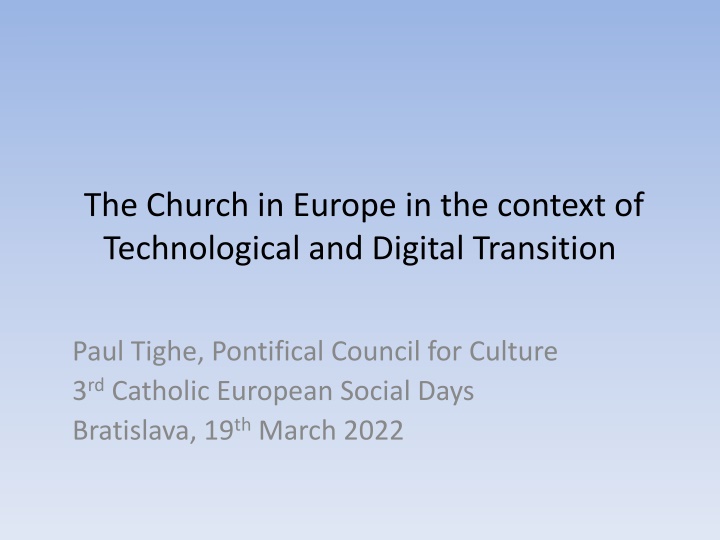
The Church in Europe: Navigating Technological and Digital Transition
Explore the intersection of technology and culture within the context of the Church in Europe, addressing issues of identity, social impact, and ethical considerations. Delve into the complexities of digital transition and its effects on society, with insights on regulating technology for the service of people and promoting a fair economy and sustainable society. Discover how Catholic reflections on ethics, justice, and solidarity offer valuable perspectives in shaping a democratic and inclusive society.
Download Presentation

Please find below an Image/Link to download the presentation.
The content on the website is provided AS IS for your information and personal use only. It may not be sold, licensed, or shared on other websites without obtaining consent from the author. If you encounter any issues during the download, it is possible that the publisher has removed the file from their server.
You are allowed to download the files provided on this website for personal or commercial use, subject to the condition that they are used lawfully. All files are the property of their respective owners.
The content on the website is provided AS IS for your information and personal use only. It may not be sold, licensed, or shared on other websites without obtaining consent from the author.
E N D
Presentation Transcript
The Church in Europe in the context of Technological and Digital Transition Paul Tighe, Pontifical Council for Culture 3rdCatholic European Social Days Bratislava, 19thMarch 2022
Digital and Technological Transition Content (Presenting Issues) Context Disruption cultural, social, human Internal identity, belonging Ongoing future (transport in 1922) Potential positive (critical), credibility Existing problems post-modernism EU Strategy service of people, fair economy, sustainable society Laudato si, Fratelli tutti method, insights
Technology at the service of people Commitment human-centric, for good (ethics) Beyond optimism determinism, agency, control Regulation, corporate guidelines, stakeholders, professionals consensus (principles), trust? Neutral (dual use) bad actors, unforeseen consequences, ethical by design Technocratic paradigm political and economic context (AI and Medicine debate) Inequality, Environmental impact
A fair and competitive economy Inequality wealth, influence, destiny Meritocracy deserved/earned, fault Digital divide access and capacity (remote) Consumer protection asymmetry, digital literacy Services contracts, consent, how free? Price of services attention (data and ads) Depersonalization platform working, bots Fair or competitive global context
An open, democratic and sustainable society Potential unity, closeness, communications Polarization echo-chambers, reinforced Speed and emotion reflection and logic Fake news, post-truth no narrative (facts) Politics of division fear and hate Dialogue attitude, commitment, openness Diversity richness, inclusive
Insights from Catholic Reflection Ethics the search for truth and consensus (good functioning of society), dignity (human rights), inclusive and interdisciplinary, method Justice Solidarity and common good (beyond interdependence), Intrinsic worth (not market) Dialogue Culture of encounter, friendship (trust and honesty), intentionality (personal responsibility) Anthropology bodily, social and graced (vulnerability) Education pedagogical and curriculum
